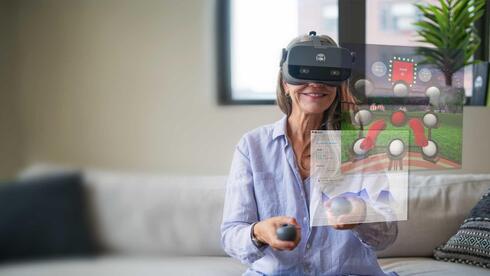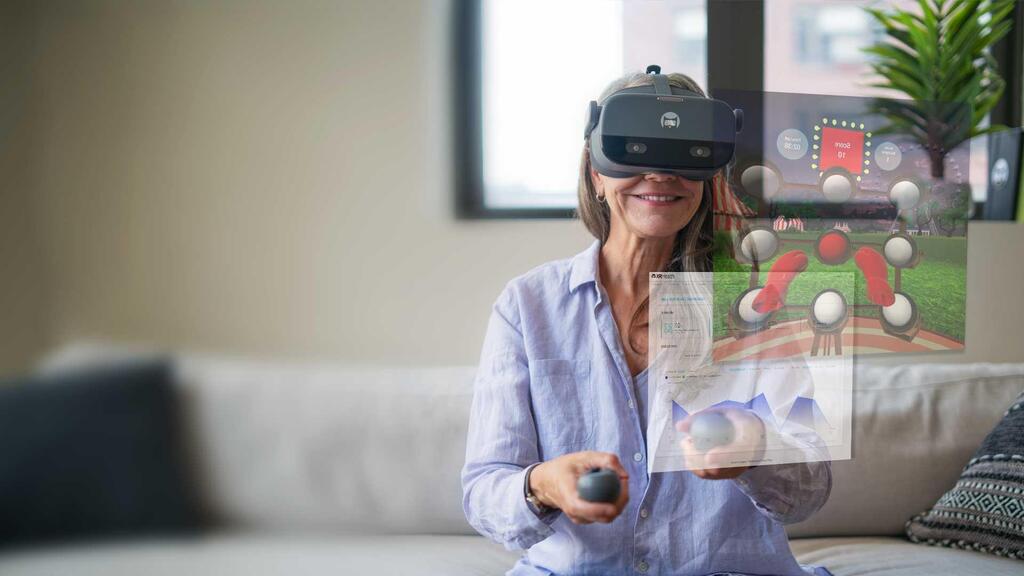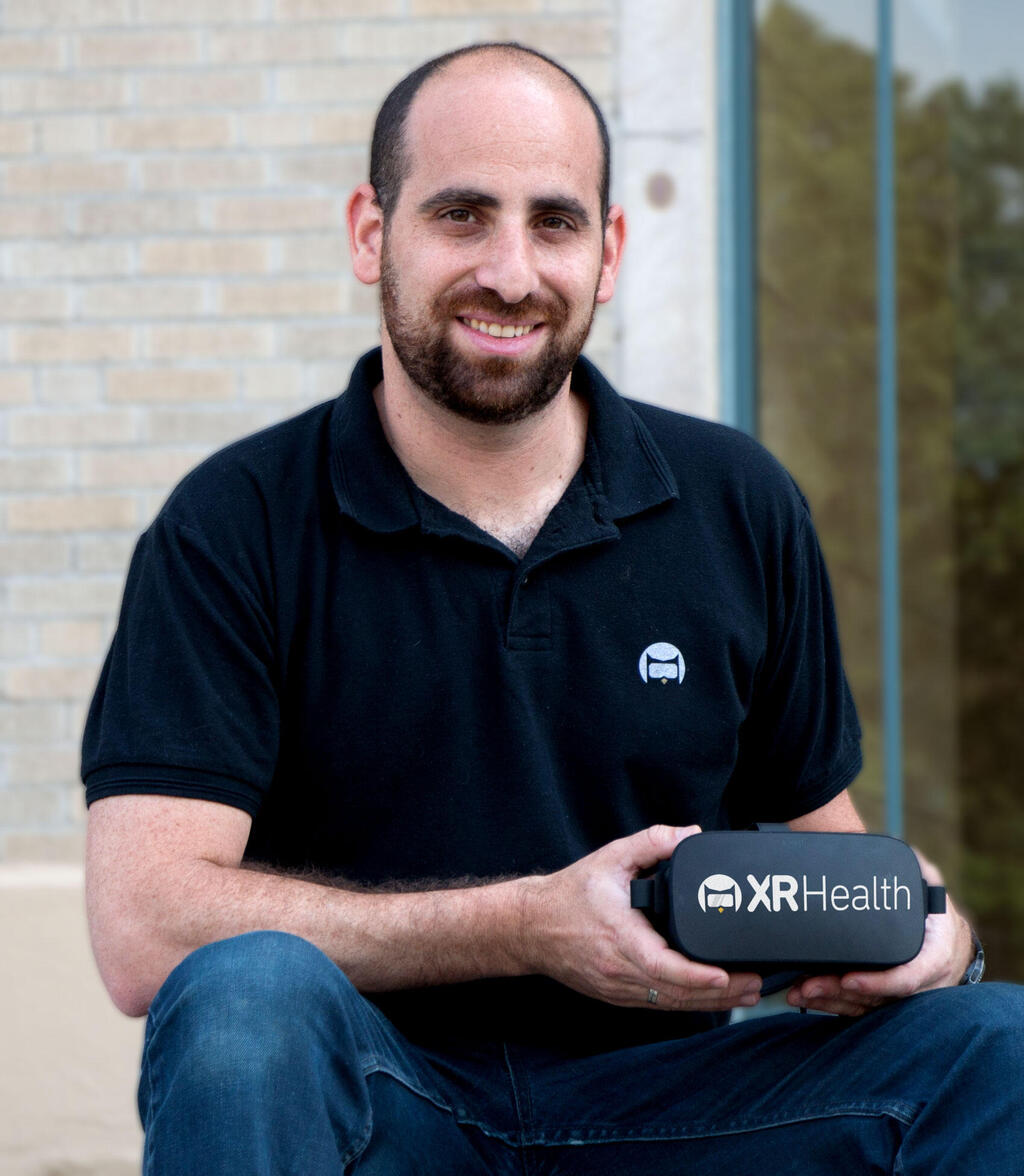
XRHealth is taking physical patient care into the digital world
The Israeli company has introduced virtual reality to healthcare professionals and patients looking to change the way therapies are delivered and measured.
Israeli company XRHealth has developed a platform that provides virtual spaces using VR for a myriad of uses in the healthcare sector. The tool can be adapted for relaxation and mindfulness, physio or cognitive therapy, or to tackle mental health issues among patients of all ages.
“I personally think that it's just a matter of time until this will become one of the most important tools in healthcare,” said Founder and CEO Eran Orr. “I think healthcare and education is where we'll see this technology thrive because it does make a big difference compared to the current technology that is out there.”
Orr founded the company in 2016 as a former IDF F16 pilot who was diagnosed with a whiplash injury during his service. Since then, it has developed more than 150 VR ‘Spaces’ dedicated to several different treatments relating to physiotherapy, cognitive tests, and mental well-being accessed through a Pico VR headset and accompanying joysticks. Patients can access the device either through their healthcare insurance plans or privately via a monthly subscription. Headsets are then sent to patients’ homes and can include personalized plan-of-care, video calls with therapists, and progress tracking to ensure therapy targets are adequately met.
CTech was invited to experience the Pico device and XRHealth technology in person. The device differs slightly from the Meta Quest in its shape and size, but is pretty typical for a headset (users can also download XRHealth’s platform directly into their existing Meta devices).
The initial digital homeroom is a rotation of VR immersive settings. While you become accustomed to the technology, your environment is either an attractive penthouse, a seaside view in what looks like the Mediterranean, or many other relaxing environments. For the first adventure, I was guided to experience a wellness video designed to enhance relaxation: an underwater swim with dolphins.
For roughly five minutes, I was totally immersed underwater with the creatures of the ocean. I had a complete 360-degree view of my surroundings and could hear my environment through external speakers. For a moment the only thing unnatural about it was the fact I was breathing oxygen so easily.
XRHealth also offers help with phobias or PTSD, so I was then transported into a typical VR environment to help with that: a turbulent plane ride. Here, the physician can set the extremity such as weather, turbulence levels, or passenger reactions. Here, it truly felt as though I was on a plane with the exception that I physically had more legroom than what my virtual avatar would show. With each experience, from Apple's Vision Pro to Meta Quest and now XRHealth's tech on the Pico, I feel increasingly comfortable and immersed in tech that's finally finding prominent use cases.
Orr explained that many of its treatments are related to PTSD, notably significant in Israel since October 7. “When the October 7 attack happened, it was clear to me that there were not enough clinicians to support all the patients needed,” he said. “And I personally believe technology is the only way to solve it. I don't think anyone can hire and train the amount of clinicians needed to solve the problem.”
He recalled that the very next day XRHealth was on the plane to Israel to donate 500 headsets to anyone who needed them. By the time he landed, the company had a request for thousands of headsets, and within a week it had deployed all 500 headsets to hospitals across the country. Now, the company is on track to complete 1 million treatments by the end of 2024 - 200,000 in Israel alone treating all types of healthcare needs.
The company was also eventually able to secure donations from different organizations to treat 1,000 reservists and their family members for PTSD using its technology, with the project starting in September.
In the U.S., XRHealth is incorporated into payers such as Blue Cross, Medicare, Medicaid, and AARP, the biggest senior consumer group in the country with 35 million members. Orr confirms that most users are between the ages of 65-75. In Australia, most of its treatment is focused on autism and ASD, and America has also seen interest among Gen-Z who typically suffer from mental health challenges and anxiety.
The tool is also deployed in European markets in Spain with plans to expand into the UK next year.
Toward the end of the trial, I was exposed to its physical and mental challenges to help those with cognitive or physical impairments. With the help of the company’s Customer Success Manager Yizhaq Ben Avraham, I experienced “Balloon Blast”, a game to help with upper extremity rehabilitation; “XRH-Fitness”, designed as an intensive VR full-body workout; and “Memorize” a Cognitive Training Application for executive functions and memory span for stroke survivors.
Each of them was a unique experience that showcased the immersive technology while also demonstrating how it can benefit both patients and healthcare providers with specialized, data-driven, gamified therapies. With remedies in mental health, physical therapy, anger management, or general social interactions, XRHealth looks poised to take on a variety of challenges in the healthcare space to increase awareness and treatment for all ages.
XRHealth is headquartered in Boston with its R&D Center located in Tel Aviv. It has raised a total of $39 million in funding according to Pitchbook after an initial $10,000 investment from a family member and $750,000 from a family in France.















